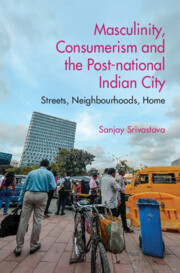Book contents
- Frontmatter
- Dedication
- Contents
- List of Figures
- Acknowledgements
- 1 Introduction: Masculinity, Modernity, Urbanity
- 2 Nationalism, Masculinity and the City
- 3 Dislocated Masculinities and the Unofficial City
- 4 Thrilling Affects: Sexuality, Masculinity, the City and ‘Indian Traditions’ in the Contemporary Hindi ‘Detective’ Novel
- 5 Fragmentary Pleasures: Masculinity, Urban Spaces and the Commodity Politics of ‘Religious Fundamentalists’
- 6 Technotopias: Masculinity, Women, the City and the Post-national Condition
- 7 Conclusion: Masculine Body Politics
- Bibliography
- Index
1 - Introduction: Masculinity, Modernity, Urbanity
Published online by Cambridge University Press: 06 September 2022
- Frontmatter
- Dedication
- Contents
- List of Figures
- Acknowledgements
- 1 Introduction: Masculinity, Modernity, Urbanity
- 2 Nationalism, Masculinity and the City
- 3 Dislocated Masculinities and the Unofficial City
- 4 Thrilling Affects: Sexuality, Masculinity, the City and ‘Indian Traditions’ in the Contemporary Hindi ‘Detective’ Novel
- 5 Fragmentary Pleasures: Masculinity, Urban Spaces and the Commodity Politics of ‘Religious Fundamentalists’
- 6 Technotopias: Masculinity, Women, the City and the Post-national Condition
- 7 Conclusion: Masculine Body Politics
- Bibliography
- Index
Summary
Introduction: Men in Cities
From July to August, many parts of north India witness the kanwariya pilgrimage activity that relates to the worship of the god Shiva (Figure 1.1). Pilgrims collect water from the River Ganges and bring it back to their local Shiva temples. The water is carried in containers that are slung on shoulder contraptions that are known as kanwars. From being a relatively small-scale affair, over the past decade or so, the pilgrimage has grown to one that involves several million participants.
Tented encampments are set up along the various pilgrimage routes. These serve as night shelters and offer food, sleeping and toilet facilities. The camps are sponsored by a variety of bodies such as market-traders’ organisations, village groups, urban ‘residents’’ welfare associations (RWAs) and private businesses. They are also sponsored by caste-specific associations. The encampments are usually set up on public land, and there is state support in building the boundary walls, hiring the tents and regular spraying of disinfectants. Increasingly, as I observed during the pilgrimage period in 2019, they are guarded by paramilitary and police personnel, in the light of what their organisers describe as ‘terror threats’. The police play a significant role in the organisation of pilgrimage activity, including creating safe passageways and directing traffic around the pilgrim routes.
The kanwariya procession is an urban ritual par excellence, and I open with this vignette in order to provide an ethnographic example that captures the most significant themes of this book. While the pilgrimage might have an ancient lineage, its place in contemporary times should be understood as part of the processes of the present. Shiva devotees marching along lanes, streets and highways, with security provided by the state, and food, water and rest facilities by a variety of neighbourhood organisations, tells us a great deal about relationships between masculinity, the city, religious identities, the state and new cultures of modernity.
We should begin with the idea of the entangled nature of urban processes (a theme explored in Srivastava 2015). In this context, a religious event, beyond its dimension as an aspect of subaltern ‘protest’ (V. Singh 2017), is also a window into an understanding of the nature of masculine presence in the city.
- Type
- Chapter
- Information
- Masculinity, Consumerism and the Post-National Indian CityStreets, Neighbourhoods, Home, pp. 1 - 36Publisher: Cambridge University PressPrint publication year: 2023



